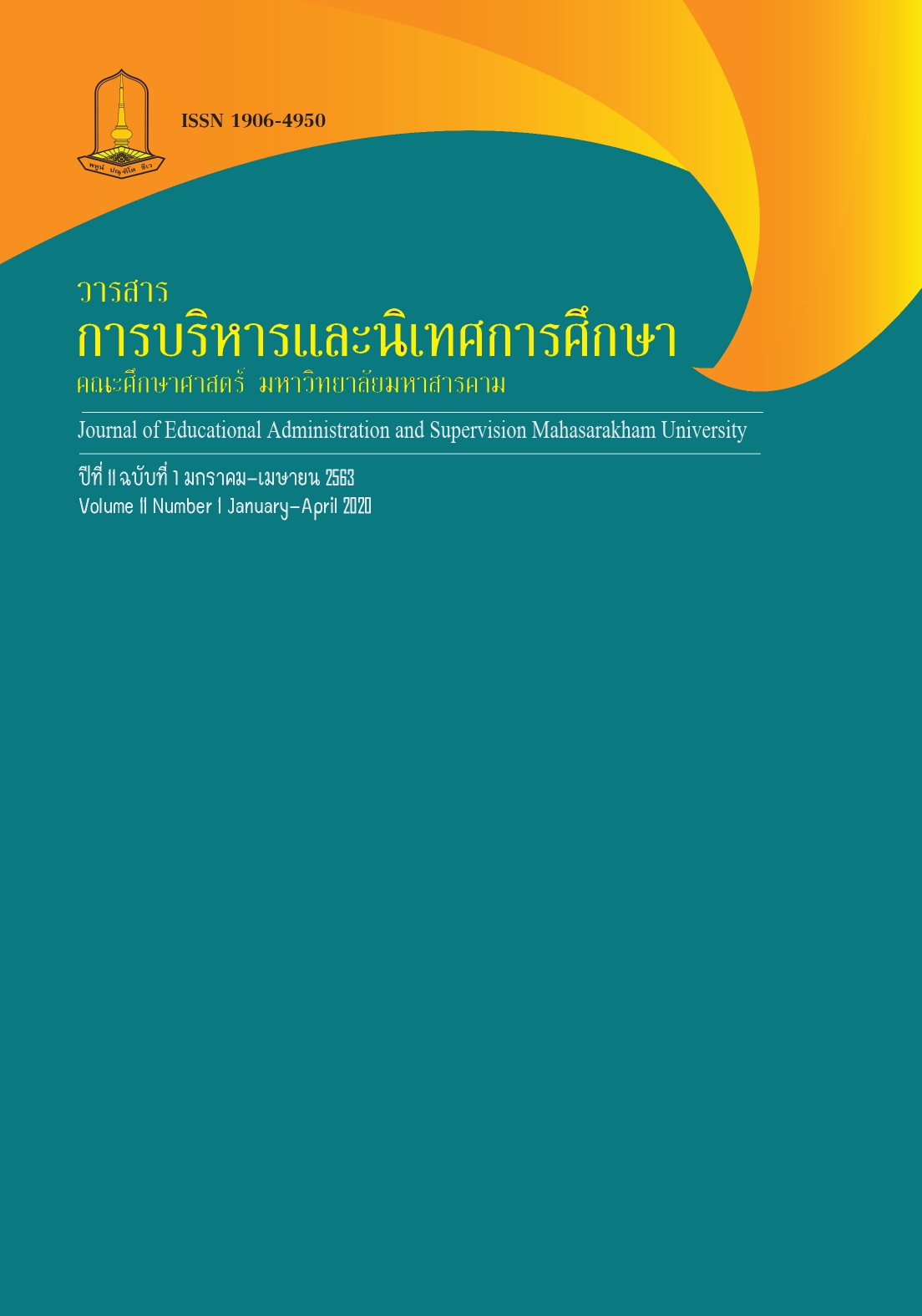The Development of Indicators for Problem Solving Skills of Students in University Demonstration School, Bangkok
Main Article Content
Abstract
The purposes of the research were 1) to construct indicators for problem solving skills of elementary school students, 2) to analyze the factors of indicators for problem solving skills of elementary school students.The tools used for collecting data consisted of an assessment form of competency indicators for problem solving skills of elementary school students in university demonstration school. They were designed to 5 point rating scales. A statistical software was used to analyze the data via frequency distributions, median, interquartile range percentage, mean and standard deviation correlation. The factors were analyzed via Exploratory Factor Analysis (EFA).
The results of the research were found that 4 factors and 18 indicators for problem solving skill of students were the first factor: the analysis of problems, the second factor: planning of problem solving, the third factor: processing of problem solving, and the last factor: assessing and checking of problem solving. After analyzing the factors, the results were following as the concepts of the theories.
Downloads
Article Details
References
กระทรวงศึกษาธิการ. (2551). หลักสูตรแกนกลางการศึกษาขั้นพื้นฐาน พุทธศักราช 2551. กรุงเทพมหานคร:โรงพิมพ์ชุมนุมสหกรณ์การเกษตรแห่งประเทศไทย จำกัด.
จินตนา ธนวิบูลย์ชัย. (2535). การคิด การคิดแก้ปัญหา และการตัดสินใจ. กรุงเทพมหานคร: มหาวิทยาลัยสุโขทัยธรรมาธิราช.
พรสวรรค์ วงค์ตาธรรม. (2558). การคิดแก้ปัญหาเชิงสร้างสรรค์ ทักษะการคิดในศตวรรษที่ 21. วารสารศึกษาศาสตร์: คณะศึกษาศาสตร์ มหาวิทยาลัยขอนแก่น, 38(2): 111-121.
บงกช ทองเอี่ยม. (2561). การพัฒนาตัวชี้วัดทักษะการรู้ดิจิทัลของนักศึกษาวิชาชีพครู ในมหาวิทยาลัยแบบไม่จำกัดรับ. วารสารสถาบันเทคโนโลยีแห่งสุวรรณภูมิ สาขามนุษยศาสตร์และสังคมศาสตร์,4(1): 291-302.
ปิยดา ปัญญาศรี. (2545). การเปรียบเทียบความสามารถในการคิดแก้ปัญหาของนักเรียนชั้นมัธยมศึกษาปีที่ 1 ระหว่างนักเรียนที่มีแบบเรียน การอบรมเลี้ยงดู และระดับเชาวน์ปัญญา แตกต่างกัน.ปริญญามหาบัณฑิต, มหาวิทยาลัยมหาสารคาม, มหาสารคาม.
โรงเรียนสาธิตมหาวิทยาลัยรามคำแหง(ฝ่ายประถม). (2551). หลักสูตรสถานศึกษาโรงเรียนสาธิตมหาวิทยาลัยรามคำแหง (ฝ่ายประถม). กรุงเทพฯ: สำนักพิมพ์มหาวิทยาลัยรามคำ แหง.
วิจารณ์ พานิช. (2555). การสร้างการเรียนรู้สู่ศตวรรษที่ 21. กรุงเทพมหานคร: มูลนิธิสยามกัมมาจล.
ศศิธร พงษ์โภคา. (2557). การพัฒนาความสามารถในการคิดแก้ปัญหา ของนักเรียนชั้นมัธยมศึกษาปีที่ 6 โดยการจัดการเรียนรู้ด้วยเทคนิคการแก้ปัญหาอนาคตร่วมกับแผนผังความคิด. ปริญญามหาบัณฑิต, มหาวิทยาลัยศิลปากร, นครปฐม.
สถาบันส่งเสริมการสอนวิทยาศาสตร์และเทคโนโลยี. (2546). การจัดการเรียนรู้วิทยาศาสตร์ หลักสูตรการศึกษาขั้นพื้นฐาน. กรุงเทพมหานคร: องค์การรับส่งสินค้าและพัสดุ.
สุพรรณา เพ็ชรรักษา. (2557). 21st Century ทักษะการเรียนรู้ในศตวรรษใหม่. กรุงเทพมหานคร:มหาวิทยาลัยราชภัฏสวนสุนันทา
สุวิมล ว่องวานิช. (2546). แนวทางการให้คำปรึกษาวิทยานิพนธ์. กรุงเทพฯ: ศูนย์ตาราและเอกสารทางวิชาการ.
สุวิทย์ มูลคำ . (2551). กลยุทธ์การสอนคิดแก้ปัญหา. กรุงเทพฯ: ห้างหุ้นส่วนจำกัดภาพพิมพ์.
อภิชา น้อมศิริ. (2558). การพัฒนาตัวชี้วัดความฉลาดทางสุขภาพด้านเพศสําหรับวัยรุ่นตอนต้น.ปริญญาดุษฎีนิพนธ์ (วิทยาศาสตร์การกีฬาและสุขภาพ). มหาวิทยาลัยศรีนครินทรวิโรฒ,กรุงเทพมหานคร.


